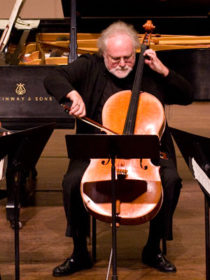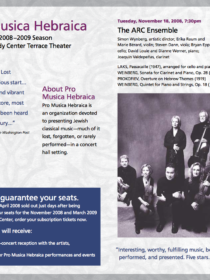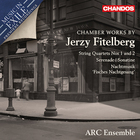On Thursday, the National Symphony Orchestra spotlighted last century’s greatest forgotten musical voices, the Polish composer Mieczysław Weinberg (1919-1996).
As Anne Midgette notes in her Washington Post review of the Kennedy Center concert, the NSO was joined by Latvian classical violinist Gidon Kremer, who “arrived at the NSO as the soloist in a concerto by a composer whose music the NSO had never played before.” Kremer is now “one of the composer’s most ardent champions,” writes Midgette.
Indeed, in a recent profile of Kremer, the New York Times explain that the Russian-trained virtuoso has been on a mission to discover and champion hidden 20th-century masters. On January 27, ECM New Series released recordings by Kremer and Kremerata of all four Weinberg chamber symphonies, along with a premiere recording of Weinberg’s early Piano Quintet of 1944.
These great musical achievements follow nearly a decade of Pro Musica Hebraica’s successful efforts to bring recognition to the great Soviet Jewish composer works through live performances of his masterpieces.
In our fall 2008 concert, Lost and Found: Jewish Musical Treasures from Eastern Europe, the ARC Ensemble of Toronto performed Weinberg’s rare wartime works. (See the full program and listen to the live concert recording here.)
Then, in our fall 2011 concert — The Last Romantics: Jewish Composers of Interwar Europe — Jascha Nemtsov & Friends played Weinberg’s famous and beloved “Piano Trio,” now widely regarded as a recovered classic of twentieth-century chamber music.
Weinberg is considered among great composers of the Soviet Union alongside Sergei Prokofiev and Dmitri Shostakovich, whom became Weinberg’s close friend and artistic partner after recognizing the Polish émigré’s huge talent. When Weinberg was arrested by Soviet police, Shostakovich adopted Weinberg’s daughter and personally appealed to Stalin for his friend’s release. (Read more about Weinberg’s remarkable life here.)

Pro Musica Presents the ARC Ensemble of Toronto: “Lost and Found: Jewish Musical Treasures from Eastern Europe” — November 18th, 2008 [Click image to enlarge]

